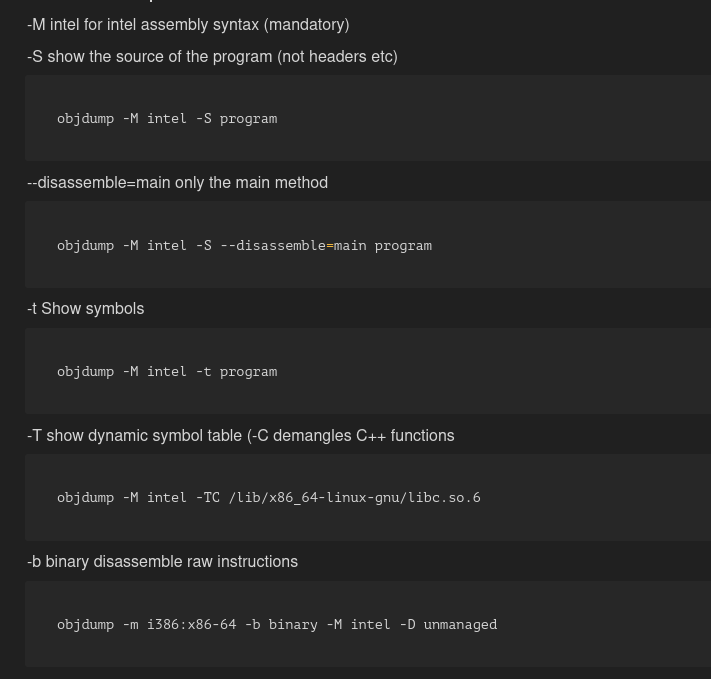Rev Intro - Liam Wachter
Reverse Engineering
KITCTF intro talk
The science and art of understanding programs without source code
If a CTF challenge only gives you:
$ ls -l
total 16
-rwxr-xr-x 1 nine nine 15640 Mär 12 21:07 weirdbinary*
How to make flag?
What is a binary?
$ hexdump -x weirdbinary | head
0000000 457f 464c 0102 0001 0000 0000 0000 0000
0000010 0003 003e 0001 0000 1080 0000 0000 0000
0000020 0040 0000 0000 0000 3648 0000 0000 0000
0000030 0000 0000 0040 0038 000d 0040 001e 001d
0000040 0006 0000 0004 0000 0040 0000 0000 0000
0000050 0040 0000 0000 0000 0040 0000 0000 0000
0000060 02d8 0000 0000 0000 02d8 0000 0000 0000
0000070 0008 0000 0000 0000 0003 0000 0004 0000
0000080 0318 0000 0000 0000 0318 0000 0000 0000
0000090 0318 0000 0000 0000 001c 0000 0000 0000
What are we up against?
$ file weirdbinary
weirdbinary: ELF 64-bit LSB pie executable,
x86-64,
version 1 (SYSV),
dynamically linked,
interpreter /lib64/ld-linux-x86-64.so.2,
BuildID[sha1]=7d9dc9ded6659e5142be365d894a299330e20229,
for GNU/Linux 4.4.0,
not stripped
Can file lie?
Yes
$ file -d weirdbinary 2>| grep " = 1" -B 1 -A2
--
341: > 0 string,=\177ELF,"ELF"]
0 == 0 = 1
bb=[0x7f29cdaff010,15640,0], 4 [b=0x7f29cdaff010,15640,0], [o=0x4, c=1]
mget(type=1, flag=0, offset=4, o=0, nbytes=15640, il=0, nc=0)
--
345: >> 4 byte&,=2,"64-bit"]
2 == 2 = 1
bb=[0x7f29cdaff010,15640,0], 5 [b=0x7f29cdaff010,15640,0], [o=0x5, c=1]
mget(type=1, flag=0, offset=5, o=0, nbytes=15640, il=0, nc=0)
--
347: >> 5 byte&,=1,"LSB"]
1 == 1 = 1
bb=[0x7f29cdaff010,15640,0], 0 [b=0x7f29cdaff010,15640,0], [o=0, c=2]
mget(type=46, flag=0, offset=0, o=0, nbytes=15640, il=0, nc=0)
--
61: >> 16 leshort&,=3,"${x?pie executable:shared object},"]
3 == 3 = 1
bb=[0x7f29cdaff010,15640,0], 16 [b=0x7f29cdaff010,15640,0], [o=0x10, c=1]
mget(type=10, flag=0, offset=16, o=0, nbytes=15640, il=0, nc=1)
--
79: >> 18 clear&,x,""]
0 == *any* = 1
bb=[0x7f29cdaff010,15640,0], 18 [b=0x7f29cdaff010,15640,0], [o=0x12, c=1]
mget(type=10, flag=0, offset=18, o=0, nbytes=15640, il=0, nc=1)
--
167: >> 18 leshort&,=62,"x86-64,"]
62 == 62 = 1
bb=[0x7f29cdaff010,15640,0], 18 [b=0x7f29cdaff010,15640,0], [o=0x12, c=1]
mget(type=10, flag=0, offset=18, o=0, nbytes=15640, il=0, nc=1)
--
336: >> 18 default&,x,""]
0 == *any* = 1
bb=[0x7f29cdaff010,15640,0], 20 [b=0x7f29cdaff010,15640,0], [o=0x14, c=1]
mget(type=11, flag=0, offset=20, o=0, nbytes=15640, il=0, nc=1)
--
339: >> 20 lelong&,=1,"version 1"]
1 == 1 = 1
bb=[0x7f29cdaff010,15640,0], 5 [b=0x7f29cdaff010,15640,0], [o=0x5, c=1]
mget(type=1, flag=0, offset=5, o=0, nbytes=15640, il=0, nc=0)
--
351: >> 7 byte&,=0,"(SYSV)"]
0 == 0 = 1
bb=[0x7f29cdaff010,15640,0], 7 [b=0x7f29cdaff010,15640,0], [o=0x7, c=1]
mget(type=1, flag=0, offset=7, o=0, nbytes=15640, il=0, nc=0)
~> binwalk
Tipps and Tricks
You can write your own magic files
-m, --magic-file magicfiles
file uses seccomp and we should make a ctf challenge out of it.
Okay we know what to do
http://ref.x86asm.net/coder64.htmlThere is help
$ objdump -M intel -S weirdbinary
weirdbinary: file format elf64-x86-64
Disassembly of section .init:
0000000000001000 <_init>:
1000: f3 0f 1e fa endbr64
1004: 48 83 ec 08 sub rsp,0x8
1008: 48 8b 05 c1 2f 00 00 mov rax,QWORD PTR [rip+0x2fc1] # 3fd0 <__gmon_start__@Base>
100f: 48 85 c0 test rax,rax
1012: 74 02 je 1016 <_init+0x16>
1014: ff d0 call rax
1016: 48 83 c4 08 add rsp,0x8
101a: c3 ret
Disassembly of section .plt:
0000000000001020 :
1020: ff 35 ca 2f 00 00 push QWORD PTR [rip+0x2fca] # 3ff0 <_GLOBAL_OFFSET_TABLE_+0x8>
If you need an assembly refresher 🧋
Can objdump lie to you
Yes, but very rarely.
data and code can be mixed intentionally to break itDecompilers
- Ghidra
- Binary Ninja
- IDA
Decompilers lie all the time
objdump cheat sheet

the dynamic approach
gdb -ex 'set disassembly-flavor intel' weirdbinary
You probably want to use Pwndbg or GEF
Tipps and Tricks
| Function | Command |
|---|---|
r args |
run the program |
starti arg |
Run the program and break on first instruction |
break expr |
Break at the given address or symbol |
watch expr |
Break when a value is written to the given address |
rwatch expr |
Break when a value is read from the given address |
continue |
continue program execution |
si and ni |
step into and step over |
Examine Memory
- x/<amount><format><size> <expr>
- Amount is the number of things to read
- Format means how the data should be printed most notably x, a, s for hex, addresses, and strings
- The size means what size the data has b, h, w, g for 1, 2, 4, 8 bytes respectively
- Expression can be (almost) any C expression
Further Reading
Processor ISA Manuals
Gdb and Pwndbg documentation
Ghidra Book
Challenges
Source Aron Hodel (flagbot)
cdn.spclr.ch/icee.zip ncat --ssl icee.spclr.ch (port 31337)
Source foxtrot, ubuntor (PPP)
plaidctf.com/challenge/11 (Hard)